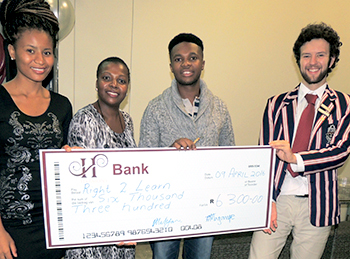
Harmony, a residence on the Bloemfontein Campus of the University of the Free State, recently made a contribution to the Right to Learn campaign. From left is: Tiisetso Magampe, Residence Assistant Finance at Harmony, Pulane Malefane, Harmony Residence Head, Sikhulekile (SK) Luwaca, Student Representative Council (SRC) Associations, and Johan Diedericks, Harmony SRC Guardian. Photo: Palesa Matsolo.
|
Harmony, a residence of the University of the Free State (UFS), recently used a breakfast for academic achievement to also make a contribution to the Right to Learn Campaign. The first-year residence on the Bloemfontein Campus of the UFS donated R6 300 to the campaign, which was started in response to the dire need for financial relief for academically deserving students from underprivileged backgrounds.
On 9 April 2016, the event was concluded with a Right to Learn poem and the handover of a cheque to the Student Representative Council (SRC) towards the campaign. The SRC launched the Right to Learn campaign on 30 October 2015 as a supplementary initiative to the #FeesMustFall movement. The proceeds will be channelled towards reducing the number of students who will face de-registration in 2016, to the SRC textbook bursary, and to food bursaries.
According to Pulane Malefane, Head of Harmony Residence, the breakfast was held to celebrate the academic achievements of the residence. Harmony prides itself on academic excellence, and instils this value into its first years at the beginning of the year.
The best academic achievers were recognised, according to their performance during matric. This was done in order to encourage the students to keep on excelling at university.
Harmony also acknowledged its student leaders motivating the first–year students.